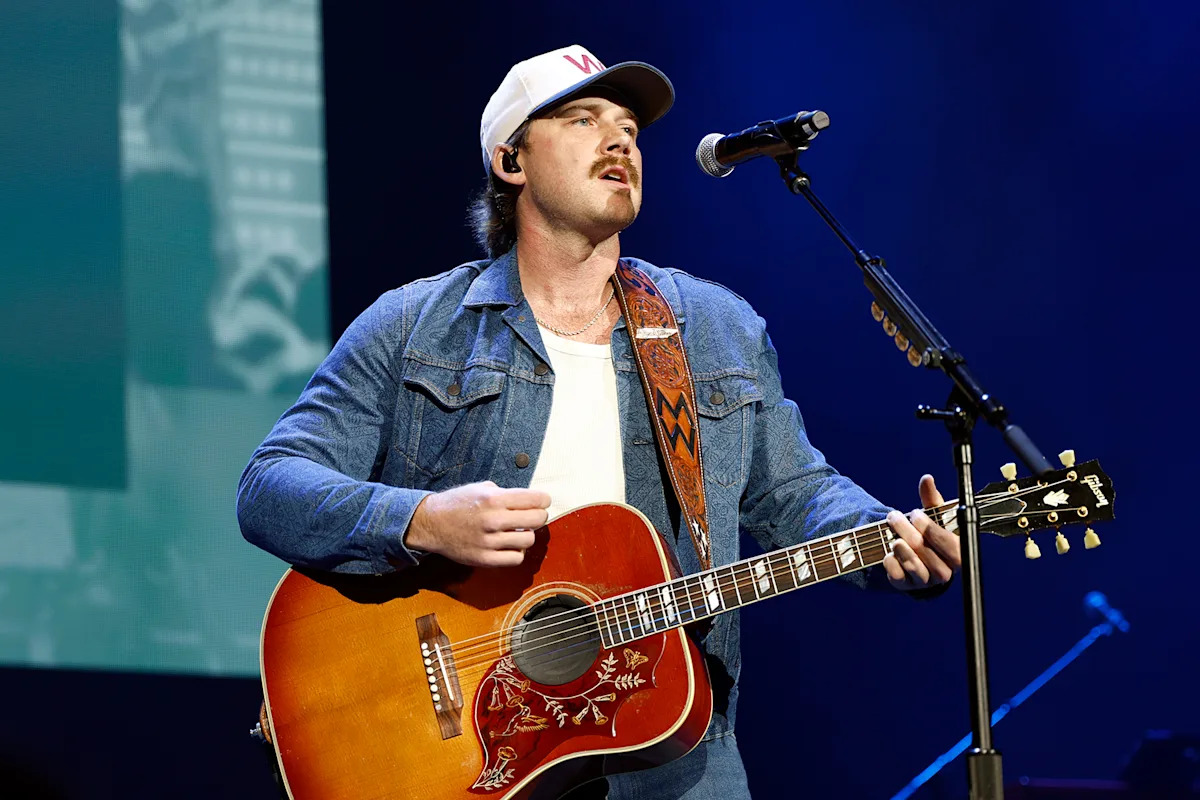Morgan Wallen, a prominent figure in the country music genre, recently stirred controversy during a performance at Rogers Centre in Toronto, where he was seen flipping off a Charley Crockett t-shirt held up by Gavin Adcock. This incident has since been interpreted by many as Wallen weighing in on a heated debate concerning authenticity in country music, particularly amidst a growing feud involving Adcock and Crockett.
During Wallen’s performance as part of his “I’m the Problem” tour, the moment unfolded when Adcock—who has emerged as a notable figure in this controversy—held up a t-shirt adorned with an image of Charley Crockett alongside the slogan “$10 Cowboy Tour.” The imagery is consistent with merchandise sold by Crockett himself. In a video clip of the event, Wallen can be seen extending both middle fingers toward the t-shirt, smiling as he walks away before continuing with his set. Unsurprisingly, this gesture ignited discussions online about the implications of Wallen’s actions in the context of the ongoing discourse about what constitutes “authenticity” within the country music landscape.
The backdrop to this incident involves deeper tensions in the country music community, particularly surrounding perceptions of authenticity and the influences that shape the genre. Charley Crockett, a rising star in the country scene, has actively voiced his concerns regarding the direction of country music, particularly critiquing the genre’s association with pop influences. Last month, Crockett addressed country fans directly through social media, asserting that, “Hey country folks. Beyoncé ain’t the source of your discontent. It was 25 years of bro country.” He further alluded to Wallen in a statement that highlighted his feelings about the industry’s direction, referencing the most popular acts in country music who may not align with traditional country roots. His comments echoed a broader conversation about how genre authenticity is being measured in today’s music landscape.
The ongoing feud gained traction following comments made by Gavin Adcock during a live performance, in which he declared that Beyoncé’s influence on country music—reflected in her song “Cowboy Carter”—is a deviation from the genre’s core. Adcock’s criticism, which also finds resonance with many fans of traditional country, has been received with mixed reactions, leading to a greater examination of who gets to define the genre and its artists.
In response to the critiques directed at him and Adcock, Crockett emphasized his own background and the influence of Black music on his artistry. Calibrating his identity against predominant narratives in country music, he declared in an Instagram post, “Black music made me. I will not apologize. Raised by a single mama. I am not ashamed. Many men have tried to destroy me. I will not lose.” This self-affirming stance not only underscores his commitment to authenticity in his music but also serves as a challenge to industry norms that prioritize commercial success over artistic integrity.
Crockett’s own features on the Rolling Stone’s “Nashville Now” podcast allowed him to elaborate on his views, where he questioned the notion that “outlaw country” is merely a subgenre of modern country. He argued that true outlaw country is about standing up for one’s rights in a rigid business system often dominated by commercial interests. He asserted, “They stand for Auto-Tune and songs written by a committee,” thereby critiquing the very fabric of contemporary country music production that may undermine artistic expression.
As Wallen’s flip-off incident brings new visibility to these discussions, many fans are left contemplating the complexities of authenticity in a genre that consistently evolves. Wallen and Crockett’s contrasting approaches embody a generational divide and differing philosophies regarding what it means to be “authentic” in country music.
The absence of responses from representatives for Wallen, Crockett, and Adcock has only deepened the intrigue surrounding this incident, pointing to a larger cultural clash and the varied interpretations of authenticity in the genre. The implications of this situation go beyond mere antics performed on stage; they delve into the essence of musical identity and the historical and social contexts that shape these narratives.
In summary, the recent events involving Morgan Wallen, Gavin Adcock, and Charley Crockett encapsulate the current state of country music, where authenticity, commercial viability, and cultural identity continuously intersect and collide. The provocative display from Wallen adds a layer of complexity to an already contentious debate, forcing fans and industry insiders alike to confront unsettling questions about the evolution of country music and the figures who embody it. As artists like Crockett strive to reclaim the genre’s roots while others like Wallen rise to fame through different avenues, the ongoing discourse surrounding authenticity remains as vital as ever. Whether this incident will lead to meaningful conversations or simply serve as a fleeting moment of controversy in a polarized industry remains to be seen, but it undoubtedly highlights the challenges and triumphs of navigating identity within the country music landscape today.
Source link










